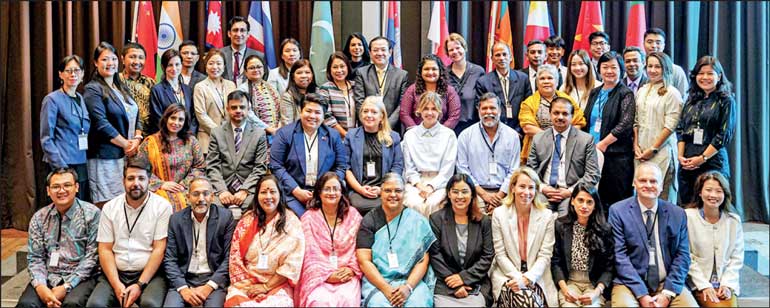Sunday Feb 22, 2026
Sunday Feb 22, 2026
Saturday, 26 August 2023 00:00 - - {{hitsCtrl.values.hits}}

The Colombo Process’s (CP) Thematic Area Working Group (TAWG) on Pre-Departure Orientation and Empowerment concluded its 6th meeting on 17 August in Bangkok, Thailand.
The meeting highlighted the critical importance of collaborative efforts in promoting pre-departure orientation and empowerment as key drivers for ensuring decent work and safe migration across South, East, and Southeast Asia.
The Colombo Process is a twelve-country regional consultative process supporting its member countries to manage labour migration in a safe, orderly, and dignified way for the benefit of individual migrants, their families and wider society, allowing collaboration, knowledge exchange and the development of new policies and practices for implementation at the national level.
The hybrid meeting brought together representatives from CP Member States, including Bangladesh, Pakistan, the Philippines, Indonesia, Sri Lanka, and Vietnam. The gathering also included participants from civil society organisations, trade unions, the private sector, and UN agencies.
The discussions cantered on the need for policy development and implementation to address the vulnerabilities faced by female and male migrant workers. The Republic of the Philippines chaired the meeting with the support of the Colombo Process Technical Support Unit (CPTSU).
“IOM’s Colombo Process Technical Support Unit is grateful to the Member States for coming together to share best practices and to highlight the progress made in ensuring good pre departure orientation for aspiring migrant workers and in taking steps to increase the empowerment of migrant workers and their families,” IOM Sri Lanka and Maldives Deputy Chief of Mission Andrew Gray shared.
During the 6th PDOE TAWG meeting, Member States provided updates on their national progress and deliberated on advancements made in alignment with the four-year work plan developed through discussions during the 5th PDOE TAWG meeting held in Manila in March 2023. They also discussed research gaps and priorities on labour migration.
In her closing remarks, IOM Asia and the Pacific Sarah Regional Director Arriola stated, “This event has served as a platform for us to enhance regional cooperation and partnerships. I commend the commitment of Colombo Process Member States, non-state actors, and other development partners in addressing the challenges and potential risks associated with migration collaboratively. IOM stands ready to continue supporting the achievement of the milestones set in this agenda through strengthened coordination, information sharing, and policy dialogue.”
The event also featured a strategic discussion regarding the future direction of TAWGs. The TAWG meeting garnered participation from over 40 attendees, representing Colombo Process Member States, the Swiss Agency for Development and Cooperation (SDC), partnering UN Agencies including ILO and UN Women, IOM CREST, the private sector, and regional and local observers from Migrant Forum Asia, as well as the South Asia Centre for Labour Mobility and Migrants.
The Colombo Process (CP) is a regional consultative process of 12 Asian countries that focuses on the protection of and provision of services to migrant workers and optimising the benefits of organised labour migration for sending and receiving countries for both migrants and their families.
This is increasingly relevant in the region as Governments recognise that migration issues cannot be addressed unilaterally. The work of the TAWGs is supported by “Governance of Labour Migration in South and South East Asia” (GOALS) Program, a joint UN program implemented by the International Organisation for Migration (IOM), the International Labour Organisation (ILO) and UN Women, with financial assistance from the Swiss Agency for Development and Cooperation (SDC).
The Colombo Process addresses the five thematic priority areas of skills and qualification recognition processes, fostering ethical recruitment practices, pre-departure orientation and empowerment, promoting cheaper, faster and safer transfer of remittances and labour market analysis.